This is pretty compressed, with respect to everything I could write about, I’m keeping a lot of thoughts in my mind, this is pretty much just a white-board.
Maybe ask me if you want to hear more.
I’ll probably formally write about how my gap year went, what I did specifically, and valuable takeaways sometime soon, but these are general reflections for the time being.
There are a lot of footnotes.
Enjoy the music.
I took a gap year ( for anyone who doesn’t know ).
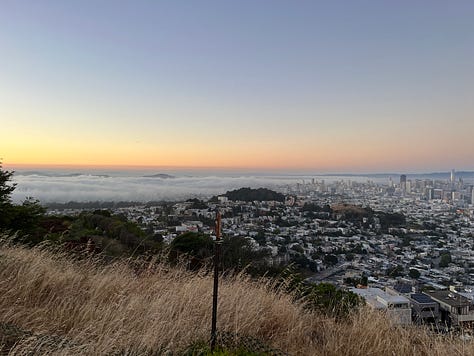
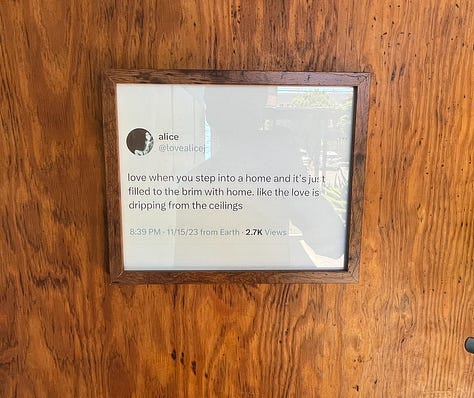

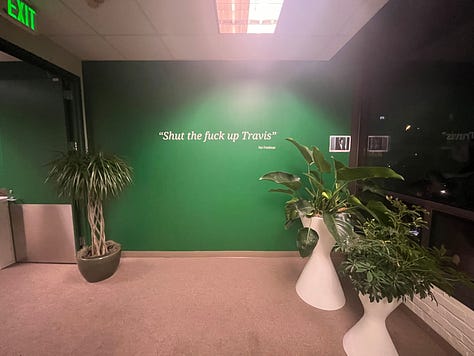

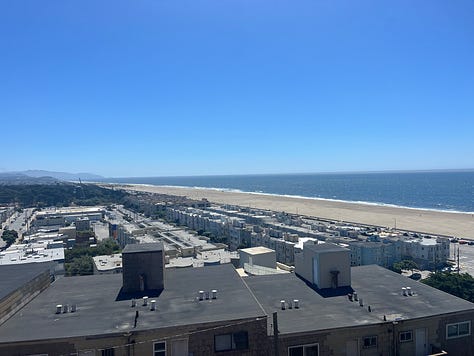


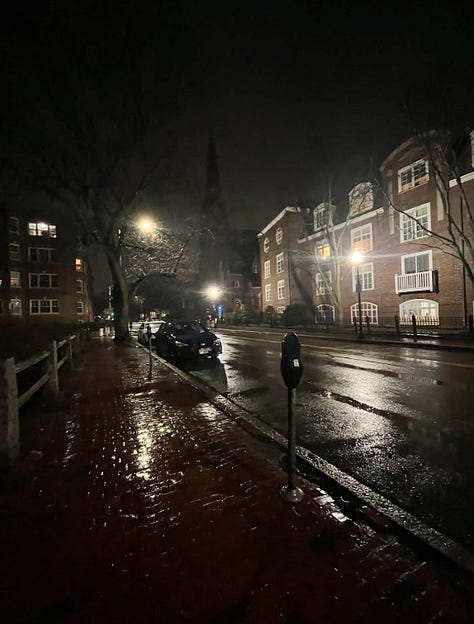
It went great. Spent half of it in Berkeley / San Francisco, about a quarter of it in Boston, and the rest with my family back in Maryland.
Met tons of great people, got opportunities to work at a variety ( ~6? ) of startups ( didn’t end up wanting to take any of them, more on that later ).
I really love math.
I’m likely going to dropout for the time being.
When I first had the thought of taking a gap year ( around Dec. of 2023 ), I never even had the notion of wanting to travel.
At the time I was really curious towards understanding how neural networks worked.
But honestly, I didn’t have much time on my hands to get into deep learning - school took up about 7 hours of my day, I was training full time (distance running), and the rest of the time I had ( 3 / 4 hours ) I spent were focused on ongoing projects / work.
At some point I thought, “I wonder how good of a machine learning engineer I can become if I spend a year working on it?”.
I never really felt much meaning in the work I was doing in school, my experience with the education system wasn’t really too great. There are honestly many things I could point out that justifiably made it an extremely suboptimal learning environment ( despite being in the IB ), but I won’t do that here. Let’s just say that after sophomore year, I began to realize how low-standard things were being ran.
I generalized the above reasoning to college as well, which looking back isn’t the best generalization to make, but perhaps a reasonable one in specific circumstances as long as you have enough awareness of what it consists of and the opportunity cost ( which you might not truly know until you directly experience it ).
And if it’s physically possible to skip the 4 years of university and go straight into some form of engineering, why not try it?
Then, ( IIRC ) flying out to San Francisco became a serious option for me when I heard about Arcadia through a friend.
So then, there was the plan.
The first couple of months went really well.
Being in a hacker house was really great as I could work freely for most of the day without disruption while being around other people who were doing the same.
The Residency’s summer cohort was going on during the time I was around the hacker house, and I made a couple of friends who were there, so I was able to get access to their events when I wanted to and meet more interesting people. I think one of the more memorable moments was sneaking into the SF half marathon with a couple of friends.
After a couple of weeks, I talked to the founder of Solaris1 ( now defunct ), and was able to work from their office space for free ( I guess the founder liked what I was doing ), and got free housing for a month and a half2 from someone I met a couple months prior on twitter and re-met at Solaris, until I settled down into my own apartment.
Essentially, the 6 months I spent in San Francisco consisted of me independently working on my own ( a lot of math and machine learning fundamentals ) and meeting cool people.
There’s a lot of serendipity ( I found ) you can find pretty quickly, if you learn how to construct a robust surface area for luck, which from my experience consists of your mindset, technical skillset, and your ability to show both3.
This was a continuing trend throughout the year.
I spent the latter 3 months in an informal “monk” mode working independently, I honestly felt as if I had absorbed the majority of the value I could’ve gotten from SF in the former portion of my stay and past that it became more distraction that not.
During this time, the majority of my days consisted of:
A 8-10 mile AM run (Saturdays were reserved for 20 mile long runs)
4-5 hours of Deep Work.
Gym or Walk.
4-5 Hours of Deep Work.
Relax.
I crafted this period of my time very carefully, to the point where I had everything set on my calendar to the very minute ( I didn’t want to misuse my time, after all it’s always limited, despite it being available ) and optimized a lot of my habitual systems with respect to time that minimized useless thought and mental effort.
I left San Francisco in December, and then I went to Cambridge / Boston for about 2 months to stay at another hacker house.
I became a little more relaxed with how I spent my time around this period, as I felt as if I got more value out of my time by enjoying more of the present moment and the people around me.
Around the time, I was more focused on reading papers, consisting of frontier research on language models and reinforcement learning, while briefly helping out at a startup.
I honestly think being around Harvard and MIT, meaning around a more academic community while still not being so far removed from a startup scene gave me a bit more awareness. I unexpectedly ended up enjoying Boston a bit more than San Francisco ( but maybe not Berkeley ), you end up being around a more diverse set of people that give you different perspectives.
Then I went back home to Maryland, where I’m at now. Home is a nice place.
Some general thoughts,
San Francisco is great, but there’s a lot of noise in the city. It’s the biggest bubble I’ve seen, but it’s one of the best places to meet and be surrounded by a large group of ambitious people.
I think the best way to look at things is to consider how culture and how ideas propagate throughout networks of people.
The tech culture around San Francisco revolves around building an AI startup, raising money, “10x cracked engineers”, being “high agency”4, and the concentration of high-energy people working on these things can make it extremely clear to you, at least if you’re not careful, that doing anything else isn’t as worthwhile, which easily creates a skewed sense of value.5
Where anywhere else, the expectation might be to get a degree, to get a job, the expectation in San Francisco is to always be building, whether it’s a startup, a product, or etc.
Deep down, I just had a desire to be curious, such that most of the time I spent building a skillset with respect to machine learning ended up with me learning more of the theoretical implications of various algorithms and working on a lot of math, because that’s what I felt genuinely obsessed about. Knowledge for the sake of knowledge.
So a lot of the time, the outcome driven culture that I saw and experienced around me, lacked authenticity, because I wasn’t curious about the direction most people were heading in.
The sense of inauthenticity, of what was going on around me, wasn’t a function of seeing people around me be superficial with regards to their work (I’m not the one to judge whether someone is being authentic or not), but rather coming from what I internally valued.
If I had to ask myself what I wanted to do on the long-term, and I looked around me, I’d come to realize I wasn’t satisfied with what I saw.
I mean mf, I was working on mathematics in an office for AI SaaS startups.
A lot of doors I had open felt like trajectories that would end up with me getting stuck in a local optimum, despite them being something that seemed tangentially of high value.
The global optima to me ( if I purely consider what I want to work on ), broadly speaking, is to be in the position where I’m able push some frontier of knowledge forward and apply it into some form of scalable and usable technology.
If humans can create new knowledge, not constrained to induction, why should I let my limit converge to being an engineer or more generally work that involves problem-solving with existing paradigms, rather than working on something that directly leads to the former6, which if done properly can yield more impact7.
And while that’s the utilitarian side of things, I’m also genuinely curious to know and learn complex fields on a deeper level. So perhaps that’s my real driver.
I spent a significant portion of my time to myself, and I never gave myself the chance to fully integrate myself within a singular community despite meeting loads of new people during the year.
I think this exposed me to a lot of different perspectives and gave me a broader lay of the land than a funneled point of view, while at the same time I gave myself the freedom to stay away from any obligation or commitment to anything.
So eventually, I internalized that there was literally nothing stopping me from doing anything I wanted in whichever direction I wanted to go8. Having the optionality is great, and I think you should ( internalize ) always be aware of the optionality, so you’re able to easily let go of things in life at moments notice when you realize they aren’t suited for you, without any regret9.
Then I realized, I ended up deciding too quick, before I even gave myself the opportunity to gain a deeper level awareness of multiple fields that exist out there. I only realized the pain point when I found that I had no explicit reason to continue working on what I was working on, rather than pivot to doing something I was more curious about, but then realizing that I was innately curious about multiple fields that exist out there10.
At some point, I was a little confused the proper direction to head in on the long-term, especially after I left San Francisco11.
I kept working, on things that combined curiosity and utility for the outcome I thought I wanted, but once I got multiple options to take the outcome I initially wanted, I realized I didn’t want the outcome anymore12 even though I had gotten it ( as to why I declined the chance to work at a handful of startups13 ), partially for the former reasons.
I reasoned that having the chance to follow your intellectual curiosity ( for as long as possible, ideally indefinitely ) is something you shouldn’t compromise on, as you’ll only do the best work you can do by actively working on your curiosity, and therefore taking any opportunity that compromises it will hurt on the long-run ( and the freedom to work on what you want is pretty great14).
Then, figuring out what I really desire is the most important truth I can stumble upon15, as once I do, fulfilling that desire and subsequently becoming good at the type of work which it consists of, becomes a formality as the problem is deterministic and (as long as) there’s a deep desire to solve the problem16.
Funnily enough, I keep converging back to the same mental model I derived for myself about two years ago as the as a general optima to go about life17.
Work on what you’re most obsessed18 about, such that you work on what maximizes enjoyment of the present and progress for the future, while having no regret19, and any outcome you receive is the natural byproduct of you doing so20.
Do it around exceptional people, where exceptional is with respect to what you consider to be exceptional for yourself and not a general notion of “impressiveness”.
Now, what’s next?
Well I have a very general multi-year framework for what I’ll be doing.
As for the direct next-step, I have a pretty bold conjecture I’m going to take.
I think I’ll be in the Bay Area in the following year.
I think I’ll leave it at that for now.
If you’re reading this and things end up going well, you’ll probably know.
Thanks to Jacob.
Thanks to Ric.
I never asked for anything. Opportunities just landed in my lap, for the most part.
Sure, you can call someone high agency, but if you don’t know if they really got what they wanted, how do you really know they are high agency and you aren’t just being too impressionable? If I define agency as having the capacity to solve problems, and situations are defined as problems only with respect to what one wants, then you can only really identify someone as high agency if they have the capacity to solve their own problems ( and get what they want ). And if that’s the case, why would you even care if someone calls you high agency or not, if it only really matters with respect to yourself?
Fortunately, I consider myself good at identifying long-term value vs not. I realize I have an internal intuition for knowing what matters on the long-term. For how I got this, that’s another long story.
This tweet sums things up pretty sell. Maybe this one. Maybe this one as well. Definitely this one. Here’s my general sentiment as well.
I listened to a lot of David Deutsch’s talks on Epistemology. Can’t unsee it. Here’s a general overview. Here’s a longer overview.
Of course, you always know this, but there’s a difference between internalizing and knowing, where internalizing comes from direct empirical realization. It becomes more powerful at that point, because your actions become directly driven by the thing which you internalized.
I think having the ability to make a 180° pivot and letting go of things that previously mattered to you, at moments need, is one of the better abilities cultivate early on. Most importantly, to avoid any sunk cost so you don’t end up wasting your time. I think a good heuristic is, if you don’t see yourself heading in the current direction you’re heading on the long-term, you should immediately let go and pivot. Of course, you’ll always need to do things you don’t want to do to get an outcome you want, but you should refer to the overall direction and not its tangent.
I realize I was never an outcome driven person. Many times in the past, when I’ve done “hard” things to get to an outcome I thought I wanted, I realize that I valued the doing rather than the getting, such that the “hard” thing became the obvious thing for me to do, because I liked it so much. Running is a huge personal example. Any ambition that I might’ve externally shown was pretty much byproduct of doing what I enjoyed, as good as I could. I think directly trying to do something ambitious for it’s own sake of ambition is the wrong thing to do, it never worked out for me from what I recall. Similarly, I don’t think anyone should build a startup for the sake of wanting to build a startup (but there are probably some edge cases to this heuristic), but rather should because that’s the optimum vehicle they need to do what they want.
At some point, I somewhat resonated with Vinay Hiremath’s essay, although the degree to which I did was somewhat faint and I don’t even have a fraction of the “success” he has, I felt a similar sense of “What to optimize for?”, “Why should I even optimize for anything else but doing the thing itself?”, “Why do I feel a need to optimize for anything?”, while having a sense that I was wasting valuable time by considering any of this because I needed to execute.
If I had a difficult time figuring out the answers to all this after only ~5 months of going heads down on work, I can’t imagine what it feels to the founders who’ve poured their life and soul into building their life’s work to reach some success and have it all end.
This is probably why internal drivers matter more than external outcomes.
There comes the harm of being too locked in, where you begin to shut out what you really want.
Looking back, I regret not taking one of them, but then again I wouldn’t have the opportunity I have now if I had done so. It’s hard to tell if I made the right call on that, and I likely won’t know until a few years from now.
This is an NP-Hard problem, with a search-space you have to figure out along the way and the answer will likely change overtime. Then executing on the solution is another NP-Hard problem as there are typically multiple paths to get the outcome you want unless you have a set of specific constraints that narrow things down to a singular path.
In hindsight it’s all deterministic, but there are multiple deterministic paths. Monte Carlo Tree Search might be a good mental model. Or maybe frame it as a problem of reinforcement learning, with some reasoning in a thought-space as part of the rollout ( as relying on pure empiricism could take years ).
This doesn’t necessarily mean sit back and superficially explore, I think figuring out what you really desire is best done by doing the thing directly, meaning as much real-world exposure as possible. The top 3 bullet points of Patrick Collison’s advice suit this well, and looking back I wish I had more freedom of time to properly go about this (though it’s not like I can’t do this now).
I really think it's extremely important to have an internal mental model or value system that guides emergent actions rather than the other way around.
Where the internal value system is guided by generalizable principles for what is defined as a satisfactory way to live and act.
You'll be easily swayed unless you do, how else would you distinguish what game is worth playing given all the abundance in the world and the attractiveness different paths pose.
You know, I only met a single person who shares the same point of view. They’re doing a PhD in history for the sake of enjoying history with no outcome they care about. People like this are hard to come by, but they’re great to be around.
They also blatantly told me everything they thought about San Francisco ( not written here ), which reflected what I’ve been internally holding within myself, which then solidified a perspective I had. Maybe I’ll write about this sometime.
As why would you regret working on an obsession, assuming it’s the one thing you want to work on the most.
Infinite, not finite games. Dude, running taught me so many transferrable principles. I should probably take it seriously again.



